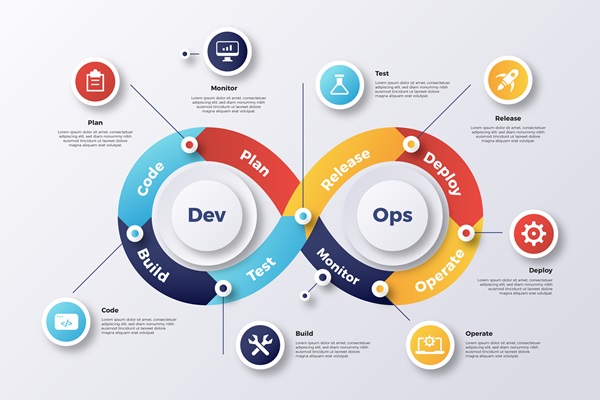In the ever-evolving landscape of software development, the integration of Development (Dev) and Operations (Ops) has become more than just a buzzword; it’s a transformative approach known as DevOps. This methodology isn’t solely about technology; it’s a cultural shift that streamlines processes, fosters collaboration and propels efficiency within organizations.
The Foundation of DevOps
DevOps stands on the pillars of collaboration, automation, measurement, and sharing (often termed as CAMS). It’s about breaking down silos between development, operations, and other related departments, aiming for smoother communication, faster software development cycles, and enhanced product quality.
Improving Operational Productivity
At the heart of DevOps lies a commitment to efficiency. The automation of repetitive tasks, such as code deployment and testing. It plays a pivotal role in minimizing errors and accelerating software delivery. Continuous Integration (CI) and Continuous Deployment (CD) pipelines form the backbone of this strategy. Automating the build, test, and deployment phases. This guarantees a seamless and uniform delivery of changes into the production environment.
Additionally, the integration of Infrastructure as Code (IaC) empowers teams to manage . And provision infrastructure through code, facilitating swift resource provisioning and scalability. This method mitigates the risks associated with configuration drifts, ensuring uniformity across diverse environments. As a result, DevOps not only streamlines day-to-day operations. But also enhances overall productivity by creating a standardized and automated workflow. Embracing these practices fosters a culture of efficiency, enabling development. And operations teams to collaborate seamlessly in delivering high-quality software at an accelerated pace.
Collaboration Amplified
DevOps breaks down the barriers between developers, QA engineers, operations teams, and other stakeholders. By fostering a culture of shared responsibility and collaboration. DevOps encourages teams to work together seamlessly, breaking down traditional departmental silos. Collaboration tools and practices, such as ChatOps and cross-functional team structures. It enable real-time communication and information sharing, enhancing productivity and innovation.
Continuous Improvement through Feedback Loops
One of the significant advantages of DevOps is the emphasis on feedback loops. Continuous monitoring and feedback mechanisms allow teams to gather insights into the performance of their applications and infrastructure. This data-driven approach helps in identifying bottlenecks, vulnerabilities, or areas for improvement, facilitating continuous enhancement of processes and products.
Cultural Transformation
However, implementing DevOps isn’t solely about adopting new tools and processes; it’s a cultural shift. It requires fostering a culture of trust, transparency, and continuous learning. Leaders play a pivotal role in driving this transformation by encouraging experimentation. It also embraces failure as a learning opportunity and empowering teams to take ownership.
Challenges and Overcoming Them
Implementing DevOps doesn’t come without challenges. Resistance to change, legacy systems, and skill gaps can hinder progress. Overcoming these challenges requires a gradual approach, emphasizing training, mentorship, and demonstrating the value of DevOps through small, incremental wins.
Conclusion
DevOps transcends being merely a methodology; it embodies a transformative mindset propelling organizations toward unparalleled agility, efficiency, and innovation. By dismantling silos, fostering a culture of collaboration, and harnessing the power of automation, DevOps catalyzes a paradigm shift in software development. This approach empowers teams to accelerate the delivery of top-tier software, aligning with the expectations of today’s rapid-paced digital landscape. Embracing DevOps is not merely a choice; it has evolved into an imperative for thriving in the fiercely competitive realm of software development. The interconnected principles of DevOps, rooted in continuous integration, continuous delivery. And shared responsibility, facilitate a holistic approach to software lifecycle management. This not only results in faster time-to-market but also ensures that software development aligns seamlessly with evolving market demands. In essence, DevOps isn’t just a toolset; it’s a cultural shift, a strategic necessity that positions organizations to not only survive but to excel in the dynamic and demanding landscape of contemporary software development.
